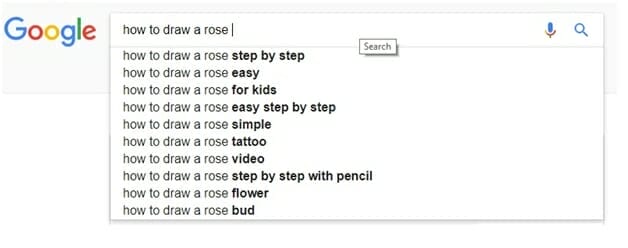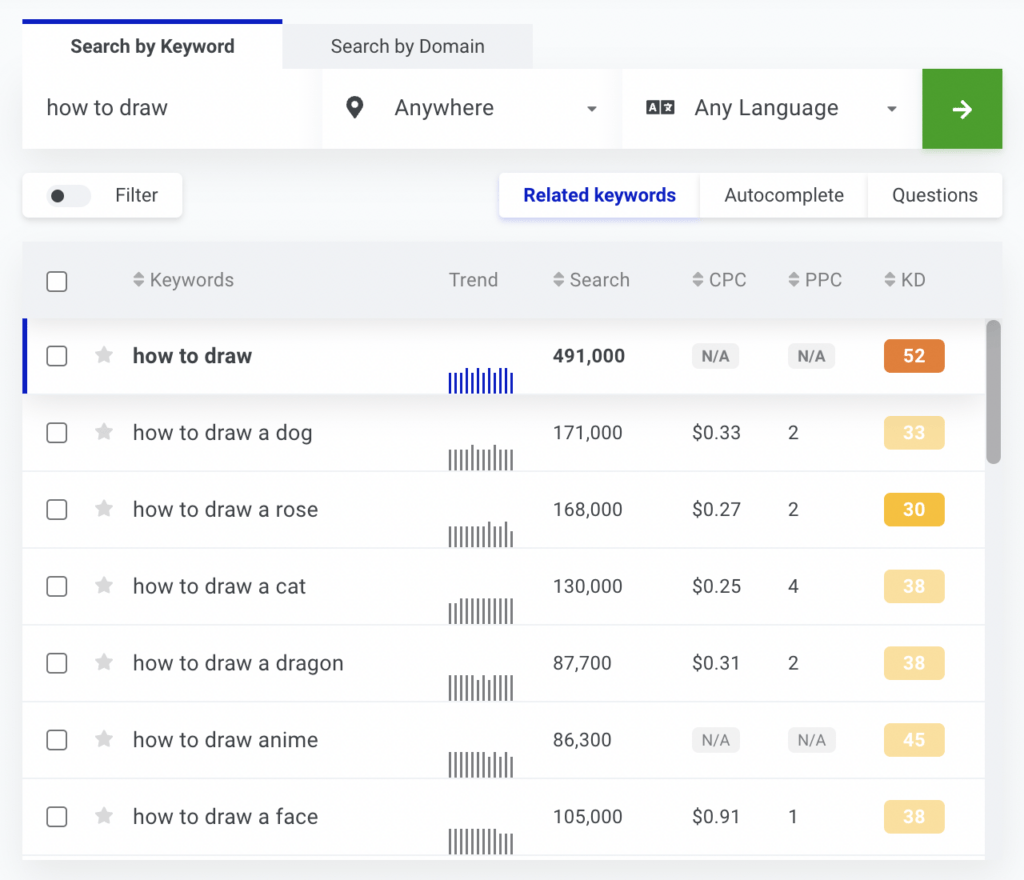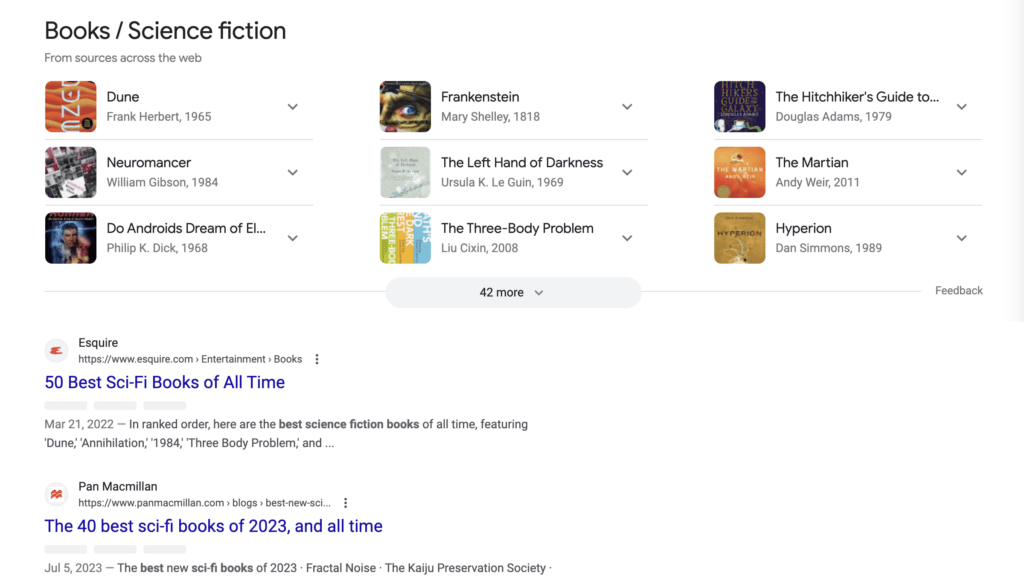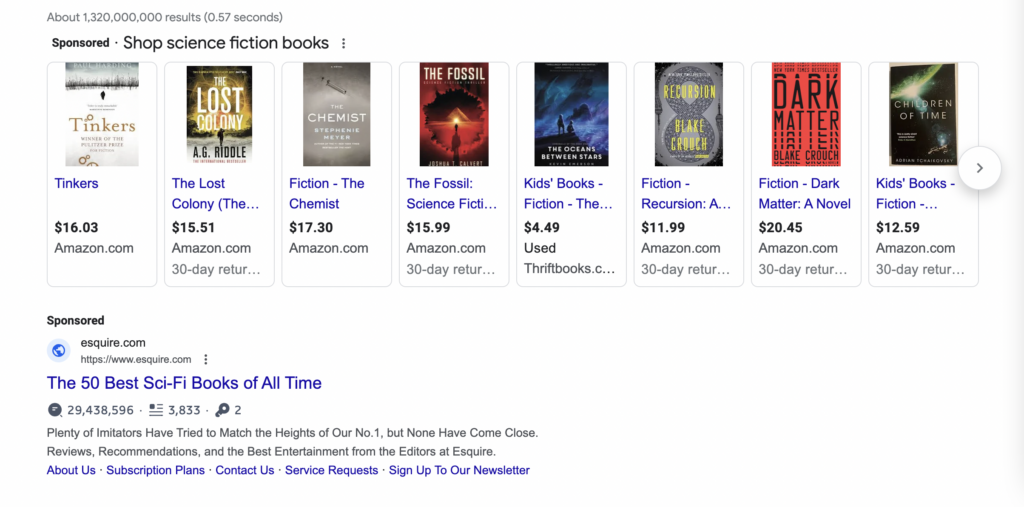Search Engine Optimization, commonly referred to as SEO, is the art and science of convincing a search engine, like Google, to send people to your website, content, or product. SEO for authors is vital if you want readers who don’t already know who you are be able to discover you and your books.
There are two primary places where people go looking for new authors or books to read: Google and Amazon. Google is the largest search engine in the world, with over 4.2 billion users worldwide and over 92% of the market share. Amazon, on the other hand, is the largest ecommerce search engine—54% of product searches now take place on Amazon (beating out Google in that particular niche)!
In this article, we’ll cover:
Why is SEO for Authors Important?
As an author, why should you care about SEO?
Because proper understanding and implementation of SEO allows you to:
- Build more traffic to your author platform
- Avoid wasting time on unwanted or redundant content creation that no one will read
- Help readers discover your book on and off Amazon
- Build your email list daily, even while you sleep
SEO for Your Author Platform
Broadly speaking, optimizing your author platform consists of three main activities:
- Researching the content people are looking for so you can provide the most value and receive the highest level of traffic in exchange.
- Presenting your content in the way that makes it discoverable by the most people.
- Promoting your content in a quality way to gain links and attention.
Throughout this guide, we’ll explore how to implement these activities to help your content rank higher in the two most important search engines for authors: Google and Amazon.
Finding the Best Keywords for Your Content
Once you have some ideas for the content you might want to write, you can use Google to carry out basic, free keyword research.
Say you write books on design and illustration, and you want to produce a ‘how to’ post for your blog to appeal to readers who might become fans and eventual readers of your books.
By typing ‘how to draw’ into the Google search bar, you receive a list of suggestions, as seen in the image below. These are the most popular variations of ‘how to draw’ searches people are carrying out on Google.

By choosing any of these topics, you can create content that at least some people are actively looking for. The research process can also help open your mind to creative possibilities you hadn’t quite thought of.
If you choose one of the suggestions from the above image, such as how to draw a rose, you will see further Google suggestions, as in the below image.

You can then either group the suggestions into a single post, or create a more focused, thorough piece of content with the aim of focusing on a single, specific search phrase.
Using Free Keyword Tools
The free method of using Google outlined above is better than nothing. After all, you will create content safe in the knowledge that people are actually searching for it on Google. However, it doesn’t tell you either of the following important pieces of information:
- How many people are searching for the idea
- How difficult it will be for your content to receive search traffic
Using a free tool, such as KWFinder from Mangools, you can get a more detailed level of information on the keyword you are researching, as seen in the below image.

This information allows you to focus your content creation on keywords that higher numbers of people are searching for, and which are realistic to rank for. (Note that the free version only allows you limited functionality, but for many authors, it’s enough to get started with.)
Another great free tool is Surfer SEO’s Chrome extension. It will allow you to instantly see how many searches are being done for each keyword you search for on Google, as well as giving you a list of related keywords and their search volume.
Consider Search Intent
One thing to consider when deciding which keywords to target is what’s called search intent. Search intent gets to the root of what results people are actually looking for when they search for a keyword.
Say, for example, you do a search for “best science fiction books” you’ll see a different page on Google’s search results than you will if you search for “science fiction books.”
Best science fiction books returns a page that looks like this:

It’s clear that Google has determined that people search for the “best science fiction books” are looking for rankings, award winners, or books that meet similar criteria.
However, if you search for “science fiction books,” you’ll see a more product-focused search results page, with an Amazon-sponsored product ad at the top:

When deciding which keywords to use, look at the search results currently being returned for those keywords. If they’re not in line with what you’re offering, consider targeting other keywords instead.
Nonfiction vs. Fiction Keywords
If you write nonfiction, you may want to create content about the same topics as your books. You can also consider writing about closely related topics. For example, if you write about marketing for entrepreneurs, writing general-purpose entrepreneurial content is a great way to get your target readers on your website.
Fiction can be a little trickier to find the right target keywords for. Writing about your books, your characters, and your writing process can all be excellent ways to attract readers. Just be even more aware about what the search intent is behind the keywords you’re using.
SEO for Author Websites
Your author website is one of your best opportunities for implementing SEO. You’ll want to focus on using your chosen keywords for each article you write, without using the same primary keywords for more than one article or page (that can result in keyword cannibalization, which is when multiple pages on your site are going after the same keywords, and so Google doesn’t know which one to prioritize).
Beyond the text, there are a few places you’ll want to focus on keyword placement:
Titles: The title of your article or page is very important when it comes to SEO. Try to use the exact keyword or phrase you’re trying to rank in search engines for in your title.
Headings: Headings within your article or page are also super important. You should use both H2 and H3 titles when possible, and make sure that at least one of them contains your target keyword.
Meta Data: Your page’s meta description is what’s often show in search results, under your page’s title. Be sure to include the keyword or phrase and make it descriptive enough that people viewing the result will want to click.
Plugins for Better SEO
If you’re using WordPress for your website, there are some excellent plugins you can use to make SEO easier to implement.
Yoast SEO is one of the most well-known freemium SEO plugins for WordPress. When you write an article or page in WP, Yoast will give you a score for how well your content matches SEO best practices and how strong its chances are of ranking for your chosen keyword. The free version is likely to be powerful enough for most authors, but there is also a premium version with additional features for $99/year.
RankMath is another freemium SEO plugin for WordPress that has similar features to Yoast. One nice feature is that it allows you to preview how your page’s result will look in Google search results. It will also give you a grade on how well your content is likely to rank based on your chosen keywords, with tips for what to improve to rank better.
There are dozens of other SEO plugins out there, and many of the paid SEO tools that exist also have WordPress plugins available (most are included with premium subscriptions to those tools).
All About Links
There are two types of links that are important for SEO: internal links and external links. Internal links are those links that you include in your articles or pages that link to other pages or articles on your website. External links are those on other websites that link to your content.
Internal Linking Strategies
When you’re writing content, consider what other content on your website would be complementary. It’s a good idea to include a few links in each of your articles or pages to other pages on your site. This helps search engines find your content, as well as tells them which of your pages you think are most important and relevant.
When creating these links, there are two things to keep in mind:
- Make sure you use the keywords you want your linked pages to rank for in the link text. This reinforces the keyword importance to search engines.
- Be sure that you don’t use a “no_follow” link for your internal links (this tells search engines to ignore the link and doesn’t benefit your SEO).
External Linking Strategies
Building the right external links to your content is crucial for helping it rank highly on Google. External links tell search engines that other people think your content is valuable and relevant.
Some legitimate ways of building external links include:
- Submit your book to reviewers who publish their reviews on their own blog or website. There are thousands of sites out there that do this, often with very particular niches (this can also help you get some direct sales of your book, in addition to the SEO boost).
- Linking to your content on forums, provided that it is relevant and useful to the discussion you are joining.
- Commenting on other blog posts with a link to your content, as long as this is permitted by the blog and adds genuine discussion/extra value to the original post.
- Getting existing blogs to link to your content, either by suggesting it as a useful addition to one of their existing posts, or by writing a brand new guest post for that site.
- Featuring on sites for reasons other than your books, but using the feature as a way to link to your platform, such as in this article on a past career.
- Appearing on podcasts or YouTube channels, offering value to their audience but also being able to link to or promote your own platform.
- Sharing your content on social media as a way to build awareness, get other people to reshare your content, and potentially to get others to include your links on sites other than their social media.
The above tactics are wonderful when done right, but when done without taste, or legitimacy, it can be spammy. So, make sure you do these in a way that makes the internet a better place.
SEO for Amazon
While SEO for authors on general search engines like Google is important, there’s one site where it’s even more important: Amazon. Even if people aren’t making book purchases on Amazon, they’ll often look up reviews there to make purchasing decisions. In other words, if your book isn’t showing up in Amazon searches for your target audience, you’ll struggle to make sales.
Thankfully, Amazon has a pretty thorough guide on what factors influence their search engine results. As of the writing of this SEO for authors guide, Amazon included the following in their list of things that impact search results:
- Product titles
- Product descriptions
- Optimized images
- Product features
- Competitive pricing
Now remember, these are their general “product listing” SEO guidelines, so they may not all apply to books (particularly the “product features” and “competitive pricing” parts).
Amazon recommends the following order of operations for optimizing your books for showing up higher in search results:
- Keywords: Conduct keyword research in much the same way that you would for other search engines. Be sure to see what other books show up for the keywords you want to target, and see if they’re what you would consider your “competition.”
- Product images: Book covers are the primary “product images” you’ll use, but consider what other types of images you could use in the A+ Content feature that Amazon now offers.
- Product titles: For nonfiction especially, does your book’s title or subtitle contain the keywords you want to rank for?
- Product pricing: Is the price of your book in line with the prices of competing titles?
- Product descriptions: You can edit your book’s blurb in order to contain the keywords you want to target here, even if it differs from the copy on your back cover.
- Key features (bullet points): Bullet points are sometimes used in nonfiction book descriptions to highlight the key takeaways someone might get from reading your book.
- Backend search keywords: Be sure to add the appropriate keywords in your Amazon KDP account for each of your books.
Try experimenting with your book’s description and other factors to see how it affects your search rankings.
Making It to the Top
Obviously, if you can get your content onto the first page of Google results (and preferably into the top 3 results), you’re going to get at least some traffic to your blogs or website, which will help you grow our audience and ultimately sell more books. (Which keywords you rank for will determine whether you get a little bit of traffic or a lot of it.)
What you do with that traffic is up to you, but keep in mind that traffic—readers—are vital to your success as a self-published author. If you don’t get readers, your writing career may eventually wither and die (even if you don’t stop writing and publishing, if you’re not selling books, it’s hard to call it a “career”).
Large corporations have whole departments of people trying to get their content to move up the search results page. But savvy self-publishers can also learn to use SEO techniques and can successfully compete with other content providers.
Taking some time to learn specific SEO for authors, experimenting with how you implement it, and tracking the results will allow you a leg up on many of your competitors.
Editor’s note: This article was rewritten and updated, based on original articles by Joel Friedlander, Dave Chesson, Miral Sattar, and Lee Foster.



